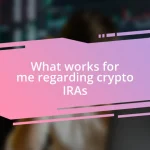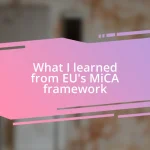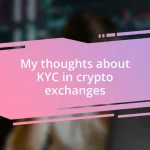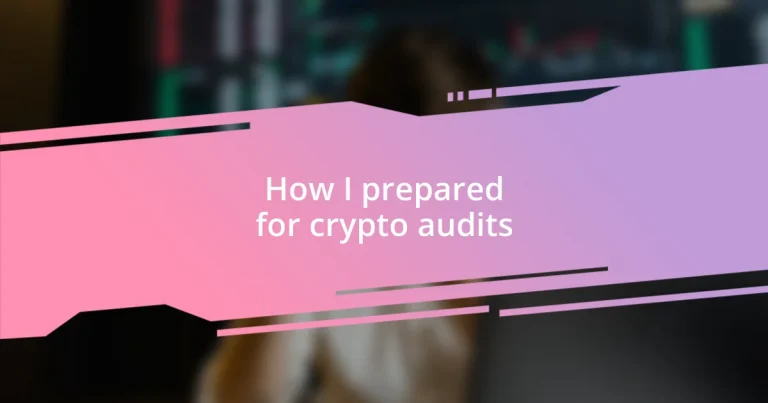Key takeaways:
- Crypto audits are essential for ensuring the integrity and security of blockchain projects while boosting investor confidence.
- Thorough preparation, including proper documentation and proactive testing, significantly enhances the audit process and fosters trust among stakeholders.
- Effective communication and collaboration with auditors can transform the audit experience from a mere evaluation into a constructive partnership.
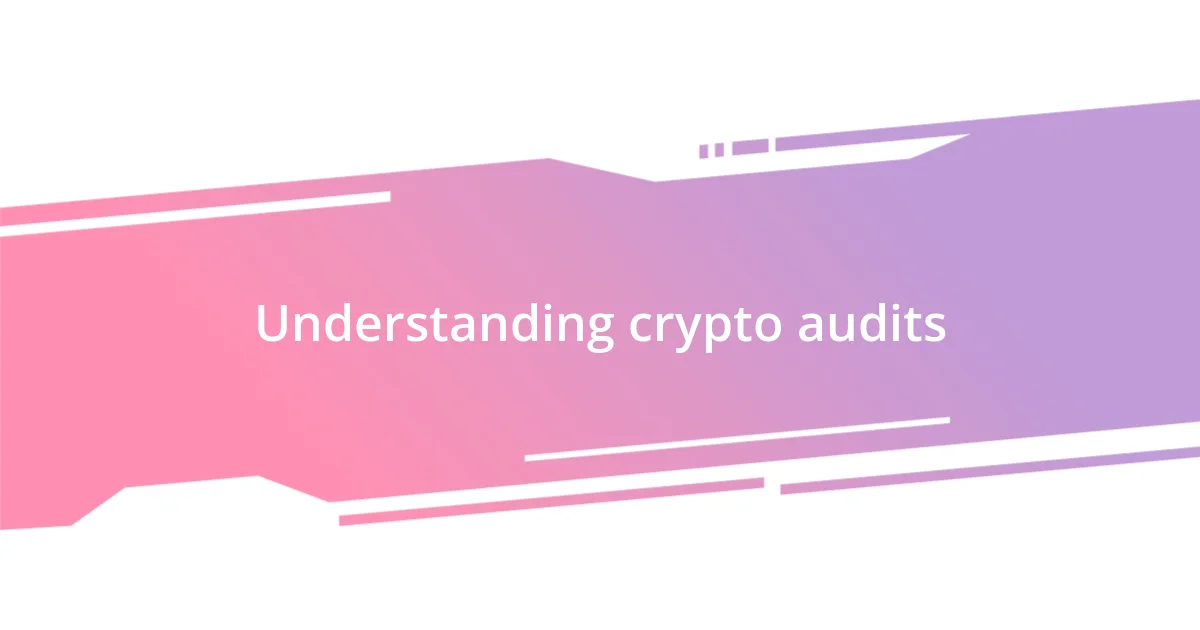
Understanding crypto audits
When I first delved into the world of crypto audits, I didn’t fully grasp their importance. I remember feeling a mixture of curiosity and apprehension as I learned that these audits serve to ensure the integrity and security of blockchain projects. Isn’t it reassuring to know that there’s a layer of scrutiny in a space often perceived as chaotic?
Crypto audits focus on assessing the smart contracts and protocols that govern cryptocurrencies. I vividly recall the moment I understood that these audits not only identify vulnerabilities but also bolster investor confidence. It’s fascinating to think how a well-conducted audit can turn a skeptic into a supporter, isn’t it?
The process itself can vary significantly, depending on the project’s complexity. Some audits might take weeks, filled with rigorous testing and analysis, while others could be more straightforward. I found myself wondering how many developers truly appreciate the nuances of this process, as it’s not just about ticking boxes but genuinely understanding how to improve the technology behind their projects.
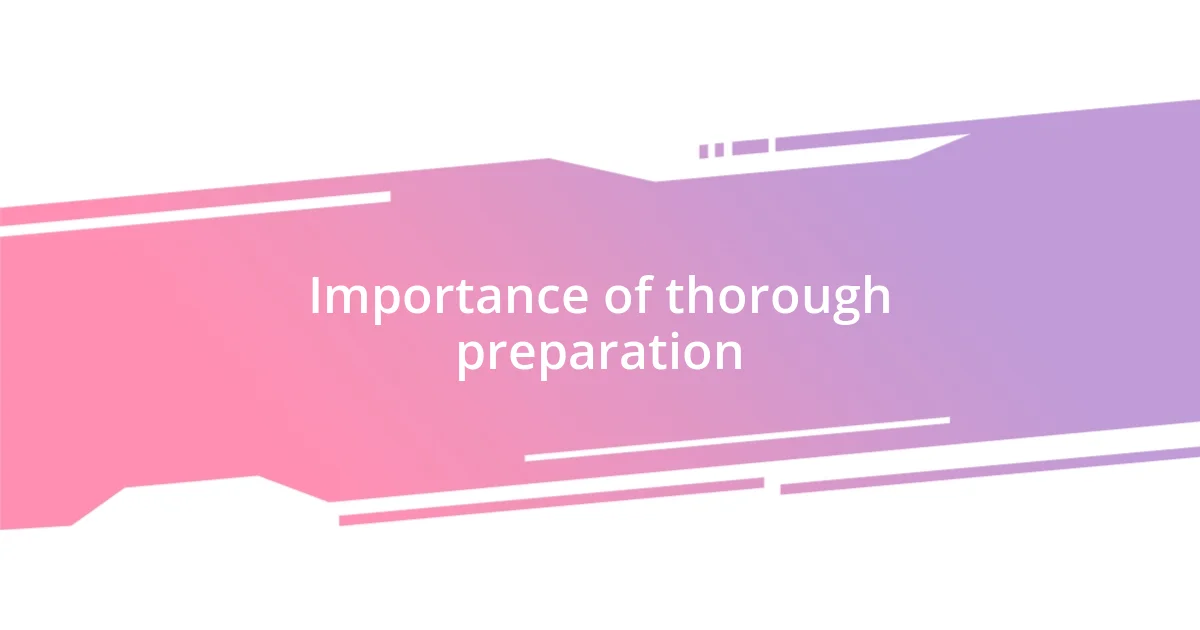
Importance of thorough preparation
Thorough preparation is essential when gearing up for a crypto audit. I remember my first experience, which felt like stepping into uncharted territory. The angst of potentially overlooking critical details loomed large. But as I systematically gathered documentation, aligned smart contracts, and scrutinized code, that apprehension transformed into confidence. This preparation not only enriched my understanding but also set the tone for a successful audit.
Here are some key reasons why preparation matters:
- Identifying Vulnerabilities Early: Proactive preparation helps in spotting potential flaws before the auditors do, saving time and resources.
- Enhancing Project Credibility: A well-prepared audit reflects professionalism, fostering trust among stakeholders and investors.
- Streamlining the Audit Process: Clear documentation and organized code make it easier for auditors to analyze the project, resulting in quicker turnaround times.
- Boosting Team Morale: Knowing you’re ready can uplift the entire team’s spirit, turning a daunting process into a collaborative opportunity for growth.
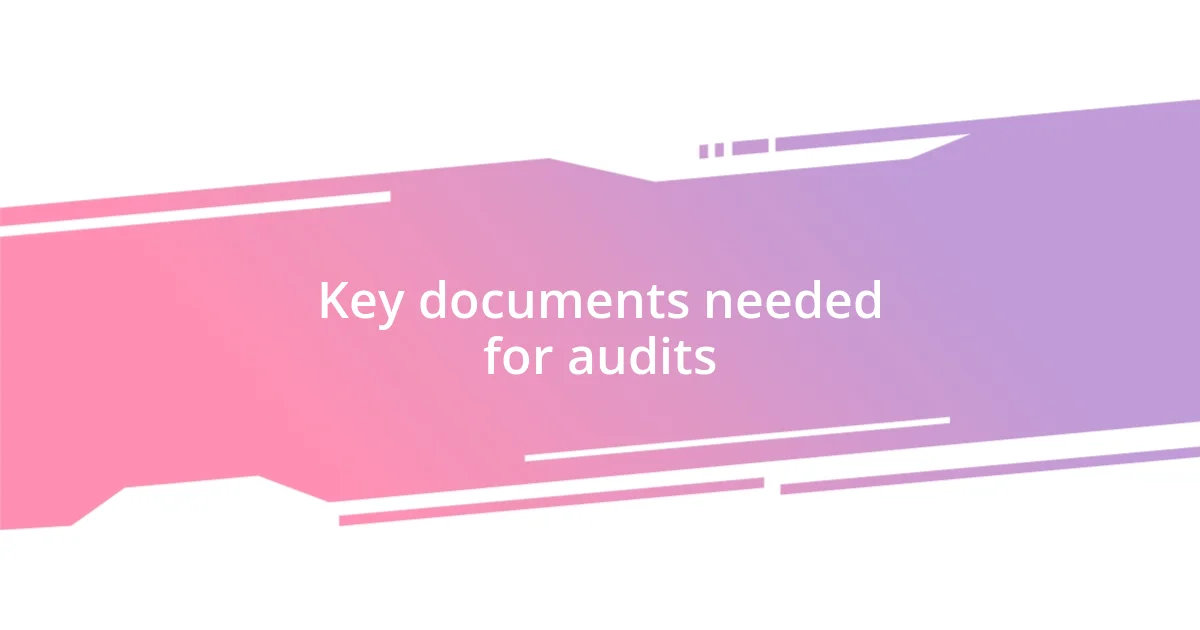
Key documents needed for audits
When it comes to key documents needed for crypto audits, preparation is half the battle. I recall a particularly hectic week where my team and I scrambled to compile everything required. The volume of documents was daunting, yet I realized this was crucial for a smooth audit process. Not only did we need smart contract codes, but also records of previous changes, transaction histories, and even compliance documentation. The clearer and more organized these documents were, the more effectively the auditors could do their job.
One essential document I found particularly valuable was the audit trail. It outlines all changes and updates made to the smart contracts over time. This transparency not only provides auditors with insight into the evolution of the project but also establishes trust. I often think about how this single document helped us clear up numerous questions during the audit discussions, saving us precious time and allowing us to focus on improving our platform instead.
I also made sure to include a risk register. In my experience, listing out potential risks, along with mitigation strategies, served as both a guide and a reassurance. It was enlightening to reflect on what we’d learned from past challenges, and it fostered a culture of proactive risk management within our team. Having these documents was not just about compliance; it was about leveraging our experiences to pave the way for a robust future.
| Document Type | Description |
|---|---|
| Smart Contract Code | The actual code used for the functioning of the blockchain project. |
| Audit Trail | History of changes made to smart contracts, showing evolution and rationale. |
| Transaction History | Record of all transactions made within the smart contracts. |
| Compliance Documentation | Records verifying compliance with relevant laws and regulations. |
| Risk Register | A list of identified risks and corresponding mitigation strategies. |
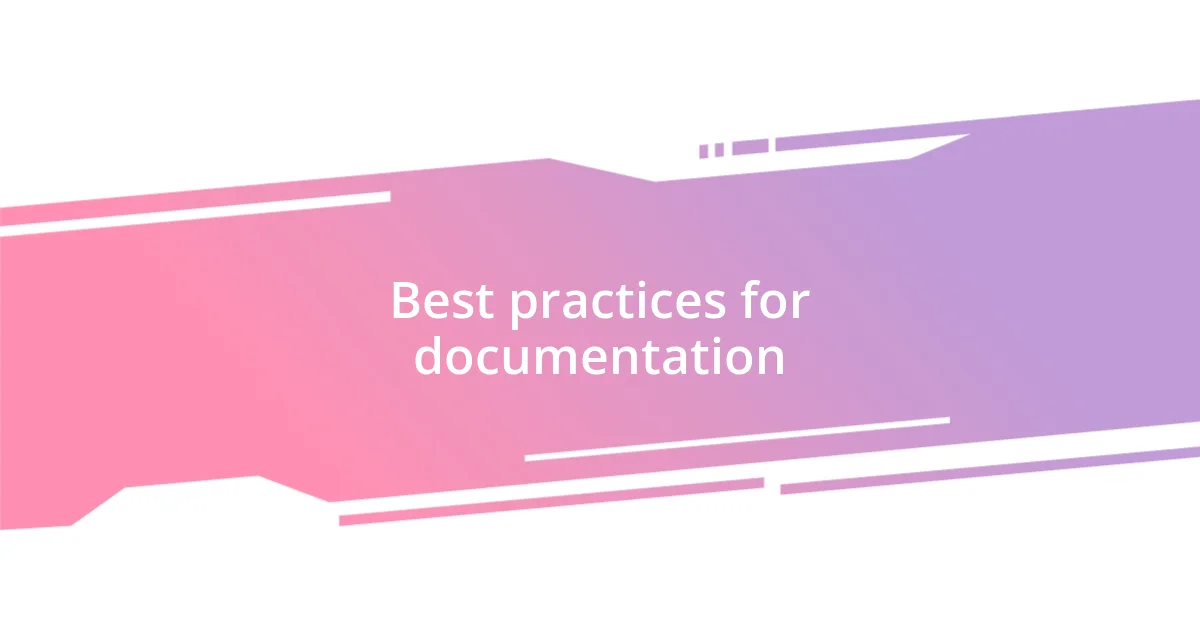
Best practices for documentation
When it comes to documentation, clarity and thoroughness are paramount. I vividly recall a moment during my preparations when I received feedback that our documents seemed like a jigsaw puzzle with missing pieces. That’s when I understood the importance of cross-referencing everything—like ensuring each smart contract related accurately to the transaction history. Have you ever felt overwhelmed by scattered information? I certainly have, and it’s a feeling I wanted to avoid at all costs.
I also learned to embrace version control for all our documentation. The relief of knowing I could track changes, review the evolution of our project, and revert if necessary was liberating. That created an environment where the team felt secure experimenting and innovating without the anxiety of losing valuable insights. I’d often ask my team, “How can we prevent future confusion?” Answering that question led us to establish a centralized document repository. Centralization didn’t just ease my mind; it fortified our collaborative efforts.
Lastly, I found a simple but effective practice in maintaining a checklist for our documentation. Each time we completed a document, I would cross it off the list, and that visual affirmation was incredibly motivating. This habit not only kept us organized but instilled a sense of accomplishment within the team. Have you ever experienced sheer joy from ticking off tasks? That was my daily reward during the auditing process—a reminder that preparation is not just about getting things done, but also about building trust and confidence in our work.
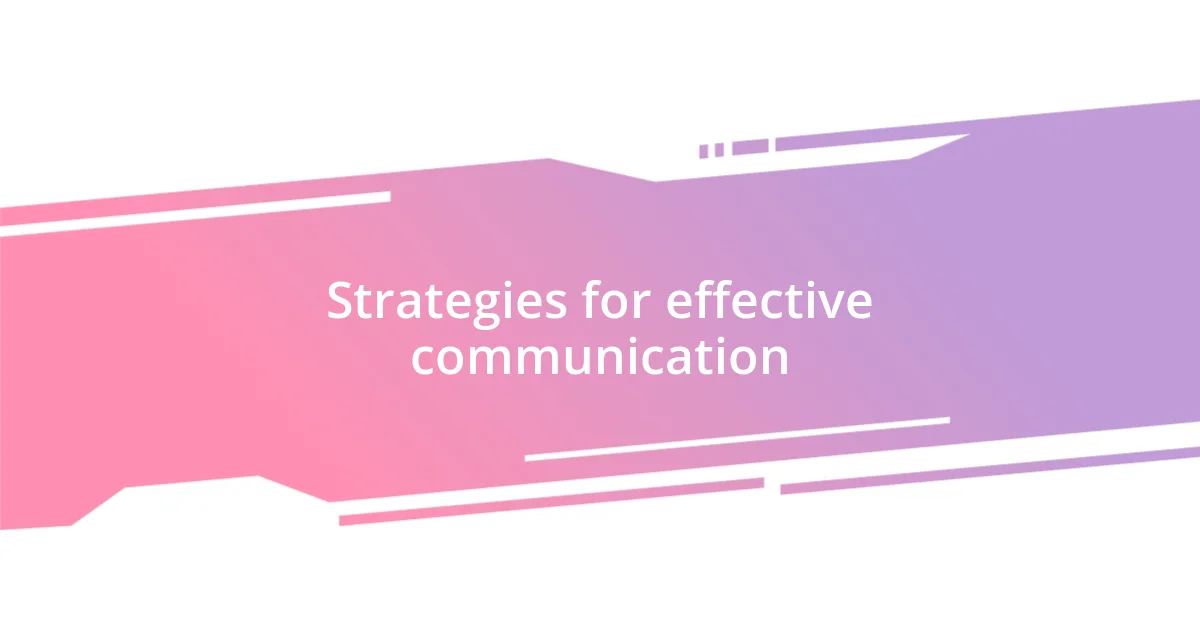
Strategies for effective communication
Effective communication is the bedrock of a successful audit process. I remember one particular meeting where the auditors weren’t just there to go through the numbers—they were genuinely interested in our vision. I made it a point to articulate our project goals clearly and how our documentation reflected those aims. This connection transformed what could have been a dry data review into a collaborative discussion. Have you ever noticed how sharing your passion can change the tone of a conversation? In my case, it fostered an environment of trust and transparency.
Listening actively was another strategy that served me well. During our audit preparation, I learned that hearing out the auditors’ concerns was just as vital as communicating our own. There was a moment when an auditor pointed out a discrepancy that I had initially brushed off. But by really engaging with their perspective, I could not only address the issue but also show them we valued their expertise. Have you found that pausing to listen can often lead to unexpected solutions? In my experience, it’s a game-changer.
Lastly, utilizing visual aids made a significant difference in our communication. I once created a flowchart that mapped out our smart contract functionalities. It wasn’t just about showcasing the process; it was about simplifying complex concepts for everyone involved. When you break down intricate details into something visual, it almost feels like bringing the auditors into your world. Have you tried using visuals to explain your work? I found that it not only clarified our documentation but also sparked engaging discussions, making the entire audit feel more like a partnership rather than a mere evaluation.
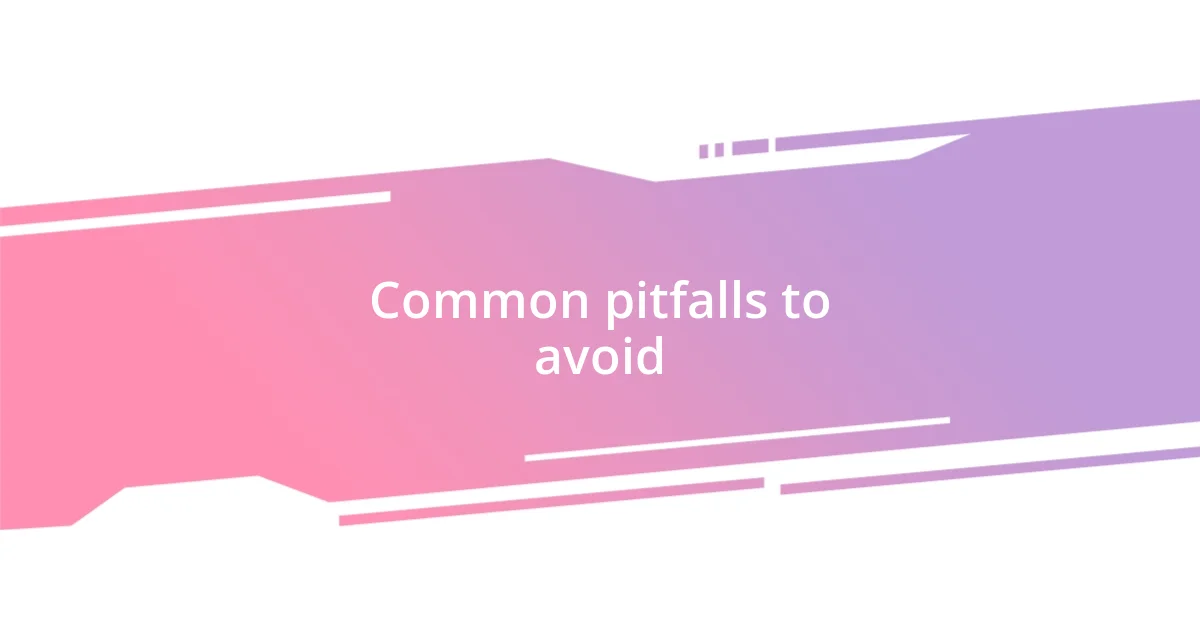
Common pitfalls to avoid
One common pitfall I encountered during crypto audits was neglecting the importance of audit trail integrity. There was a time when I didn’t fully appreciate how thorough record-keeping impacts the entire auditing process. It felt tempting to assume everything was in order; however, a lack of clearly documented decisions or changes left me scrambling for explanations. Have you ever found yourself wishing you could turn back time to clarify a decision? That’s when I learned the hard way—keeping a tight audit trail is essential for both transparency and accountability.
Another mistake I made was underestimating the need for pre-audit testing. I recall one project where we rushed into the audit, thinking our code was flawless. The shock of discovering several minor issues that could have been caught early felt like a wake-up call. I often reflect on how much smoother the process could have been had we conducted thorough internal tests beforehand. Does the idea of performing preliminary checks resonate with you? From my experience, proactively addressing potential issues before calling in auditors can save everyone a lot of time—and stress.
Finally, I noticed the repercussions of assuming everyone understood technical jargon. I once led a presentation filled with industry terms, only to see confusion on the auditors’ faces. It struck me then that my role wasn’t just to showcase my knowledge but to ensure that everyone was on the same page. Have you ever felt the frustration of your message getting lost in translation? Simplifying my language turned out to be incredibly valuable. Adapting my communication style opened up a genuine dialogue and allowed us to work together seamlessly toward common goals.
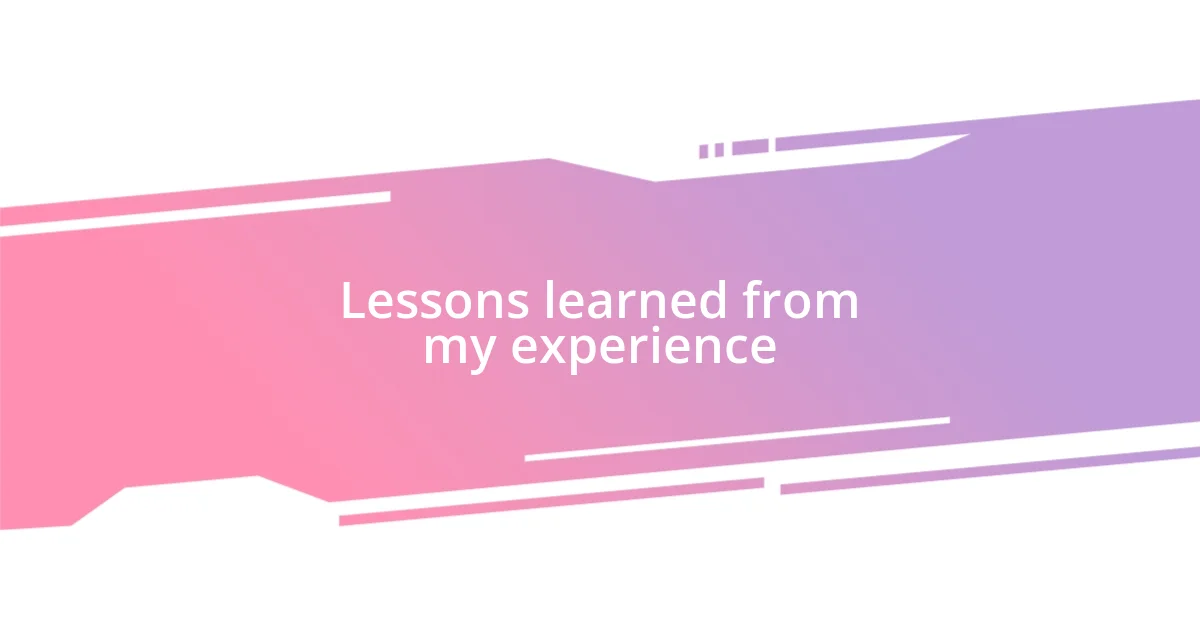
Lessons learned from my experience
Reflecting on my audit experiences, one lesson that stands out is the necessity of preparation. I vividly recall my first audit, feeling both eager and completely overwhelmed. It dawned on me that tackling crypto audits isn’t just about having the right documentation; it’s about being mentally ready. Have you ever walked into a meeting with a sense of dread? I learned that practicing my responses and having a clear understanding of the potential questions could ease that anxiety and empower me to tackle any surprises confidently.
Another key lesson for me was the value of collaboration within my team. I remember a time when I tried to manage everything solo, thinking it would reflect well on my capabilities. Instead, it left me feeling isolated and stressed. Have you faced a similar situation? By involving my team early on, we could pool our insights and tackle the complexities together. It felt rewarding to foster a sense of unity, and it ultimately created a smoother audit experience since everyone understood the project from multiple angles.
Lastly, I’ve realized that every audit is an opportunity for growth. After each audit, I took time to reflect on what went well and what didn’t. There was a moment of realization when I discovered this practice turned my anxiety into actionable insights. Have you ever thought about how reflecting on your experiences can shape your future actions? Each lesson learned became a stepping stone for improvement, transforming the audit process from a daunting challenge into an enriching journey.
